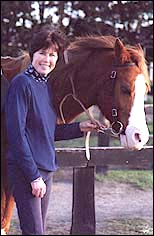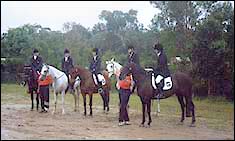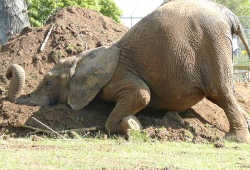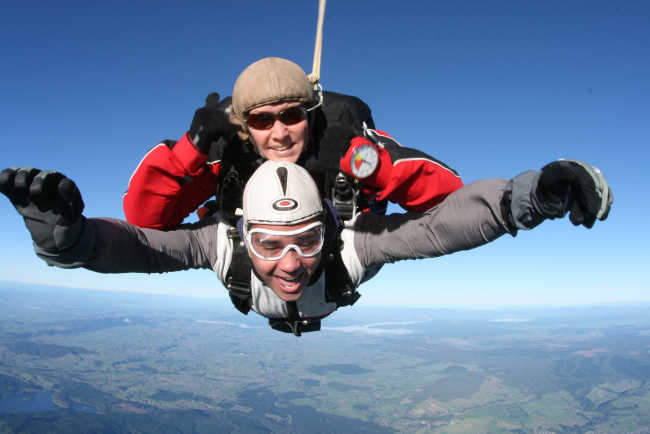Dorothy – 11/6/99
Jill Lloyd chosen to join the New Zealand team to compete in the World
Dressage Championships in Denmark in July
|
|
| Jill with a Christchurch RDA mount, Dancer Photo source Jill Lloyd |
Jill began riding when she was ten years old and got her first horse when
she was twelve. Caring for her horse and riding were her two greatest interests. She continued to ride until she had her first child and was
unable to find time for her riding.
Jill is disabled by a fall. On April 11 1994 Jill had a fall in her home and landed on the back of her
head. She became concussed and twelve hours later she was suffering the
worst headache in her life. She rang her friend Rose and told her about
the pain in her head. Then she began hallucinating and before losing consciousness she managed to grab the phone and press the redial button.
Rose had not left for work because she had been held up by another phone
call. Miraculously she had ‘Call Waiting’ so she took Jill’s call. Jill
could no longer speak but made sounds of distress. Rose realised who was
in trouble, and rushed to help Jill.
Why did a simple fall at home cause such catastrophic results? Jill was admitted to hospital, and a CT scan showed that an unrecognised
congenital problem had caused a weakness, an arterio venous malformation
(AVM), which resulted in a severe haemorrhage in her left thalamus. After
ten weeks in Christchurch Hospital she was taken to Sydney for laser treatment to shrink the AVM – a very trying experience demanding total stillness in clamps for twelve hours before the laser treatment. It took
eighteen months for the AVM to shrink.
The long road back to mobility Jill was left suffering from right hemiplegia – the loss of the functional
use of the right side of her body. At first she could not formulate a
sentence or start a conversation. What she did not lose was her determination. She began the fight back to some sort of normal life. As a
widow with three children she felt a great need to be able to resume care
of them, but the road back has been a long one.
She stayed with her mother on her return from Australia and worked to regain some mobility. Her first task was to learn to be left-handed as she
couldn’t use her right hand. That in itself was difficult, but it was
made worse by the OOS (Occupational Overuse Syndrome) which caused pain in
the left side of her neck and her left arm and wrist. She also suffered
from short term memory problems.
She went to the gym three times a week to increase her mobility, at first
at the YMCA and then at the gym run by physiotherapist, Brian McKenzie, who
taught her stretching and balancing exercises to counteract the OOS.
A time of great triumph came in December 1995 when with a great surge of
determination and effort she became able to drive her own specially adapted
car.
Boredom Jill had now achieved a degree of mobility and independence, but her family
were at school and she felt the need of an occupation and a new challenge.
She went to Enable Occupational Therapy for advice and testing to see what
work her disability would allow her to do. She tried working as a motivator and role model for the physically disabled students at Mairehau
High School. Unfortunately she couldn’t manage the physical demands of the
job.
The occupational therapist at the Head Injury Society asked her to be a
coach for a woman in her thirties who had suffered a head injury when she
was fifteen. Being able to drive Jill can take the woman to the gym and
other activities, and gets great satisfaction from helping someone with
problems similar to her own.
Joining Riding for the Disabled Feeling the need for a leisure activity in August 1995 Jill went to Kiwi
Enable, a service run by the Christchurch City Council, to find out what
activities might be possible for her with her disability. Because of her
earlier riding experience and her love of horses Jill chose to try Christchurch Riding for the Disabled (R.D.A.). At first she couldn’t ride
because of the problems on the right side of her body. She wasn’t going to
be beaten, however, and with help from Sam, her instructor in centered riding and Jenny Nicol at Christchurch R.D.A. she devised equipment which
would compensate for her disability. She began with special improvised
ladder reins, stiffened with plastic piping, and a caged stirrup to prevent
her right foot from slipping forward.
Jill’s confidence increased and she has gone from strength to strength with
her equestrian skills. She now has her own horse, Luke, a pure-bred Arab,
and trains on him three times a week. She maintains her contact with R.D.A. by riding there once a week. She gives the credit for much of her
success to the support from Jenny Nicol and her family and her training
with a Centered Riding instructor, Samantha Atkin. Working from the centre
Jill describes as “a technique enabling the rider to do quite difficult
dressage without using hand or leg” – a great advantage for Jill.
Competition experience
|
|
| The five members of the New Zealand equestrian team in Australia Photo source Jill Lloyd |
In October 1998 Jill competed in Australia with the New Zealand Paraequestrian team of five riders. This she found a great challenge and
a good introduction to international competition. It proved to her that
she was fit enough to cope with travel and the stress of competing. This
was her first competition as most are open only to the able bodied.
A difficulty at competitions away from home is having to adjust to a borrowed horse. A competitor is given a horse to try, and if the horse is
not chosen it goes back in the pool of horses and is no longer available to
that rider even if subsequent horses are less suitable.
In April this year Jill went to the New Zealand Dressage Competition for
Disabled Riders, held at Tielcey Park in Palmerston North.
Disabled Riders are graded on a scale of 1 to 4, with 1 being the most severely disabled. Jill is a Grade 2 rider. The fatigue is worse for those with brain injuries.
Jill won the New Zealand Championship for Grade 2 riders.
Selection to represent New Zealand at the World Dressage Championships Jill has now been picked for the New Zealand team of four riders to go to
Denmark in July for the World Dressage Championships and she is busy raising funds. She sees selection as a triumph in itself and also as a
build-up to reaching her highest goal – the Paralympics to be held in October 2000 in Sydney after the Olympic Games.






